How Can I Tell if My VPN Is Working Properly? Test Your VPN
A VPN that fails basic security tests can put your personal data at serious risk. Some VPNs might look fine on the surface but still leak your IP or use outdated encryption. That’s why testing your VPN is so important — without doing so, you won’t know if it’s actually protecting you.
How can I check if my VPN is working properly? It’s easier than you think. With a few simple tools, you can check for IP and DNS leaks, test encryption strength, and confirm that your real location stays hidden. And it’s worth doing — a recent study found that 53% of paid Android VPNs leak user data1.
My team and I tested over 45 VPNs, and ExpressVPN was the most secure across the board. It passed every leak and encryption test and stayed fast on all servers. Better yet, you can try it risk-free as it’s backed by a 30-day money-back guarantee.
How Do I Test if My VPN is Working?
- Download a VPN.
I recommend ExpressVPN because it consistently delivers excellent speeds and has one of the most secure and reliable server networks. - Connect to a server.
Choose a server close to your location to get the fastest speeds. - Start testing.
Use online tools to check for IP, DNS, or WebRTC leaks. Make sure your data is properly encrypted and your real location is hidden.
Short on Time? Here Are the Most Reliable VPNs in 2025
-
Editor’s ChoiceExpressVPN
Impressive speeds and no DNS or IP leaks for safe browsing without interruptions.Checked out by 7000+ users last month
- CyberGhost
User-friendly apps with specialized servers for reliable and secure connections.
- Private Internet Access
Customizable settings to optimize speed and security.
How Can I Tell if My VPN Is Working Properly?
Not sure if your VPN is doing its job? It’s important to test it to make sure your real location and other personal data isn’t leaking. The good news is, it only takes a few quick steps to check if everything’s working as it should. Here’s how you can tell if your VPN is working properly:
1. Check if Your IP Address Has Changed
The easiest way to tell if your VPN is working is to compare your IP address before and after connecting. Here’s how:
Step 1. Download a VPN
Choose a VPN known for strong security and consistent performance. It should use secure protocols like OpenVPN, WireGuard, or Lightway. ExpressVPN is a solid pick — it’s fast, works reliably on all platforms, and uses military-grade encryption.
ExpressVPN also lets you route only certain apps or websites through the VPN while the rest use your regular connection — this is called split tunneling.
 After signing up, download the app for your device
After signing up, download the app for your device
Step 2. Use an IP Test Tool
Use an IP address checker before you connect to your VPN. Make a note of your IP address — this is your real one.
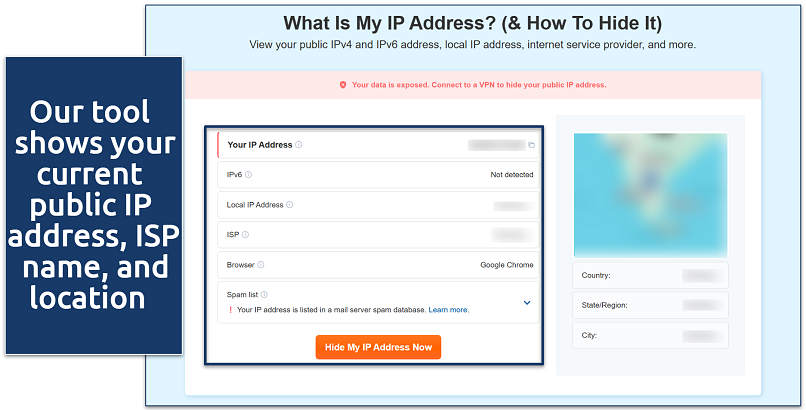 Check both IPv4 and IPv6 addresses — some VPNs don’t block IPv6 by default
Check both IPv4 and IPv6 addresses — some VPNs don’t block IPv6 by default
Step 3. Connect to a Server
Open your VPN and connect to a server (preferably one near you for better speeds). A VPN encrypts all your internet traffic and reroutes it through the server you chose, so it looks like you’re browsing from that location instead of your real one.
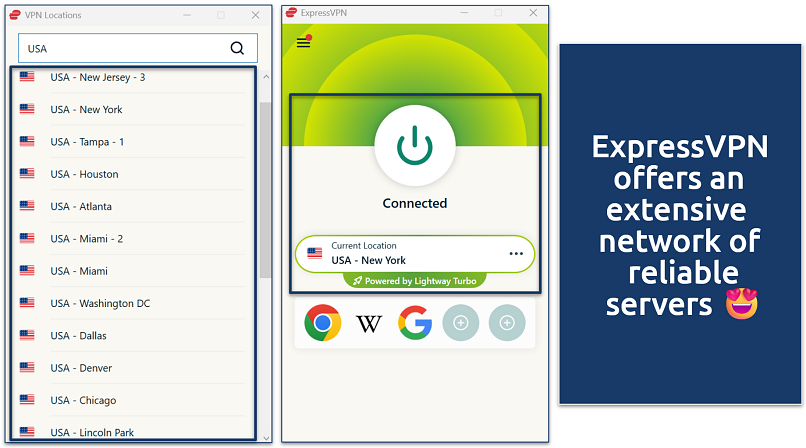 The VPN automatically encrypts and masks your IP in the background
The VPN automatically encrypts and masks your IP in the background
Step 4. Check Your IP Address Again
Go back to the same IP testing site you used in Step 2 and refresh the page. Your IP address should have changed to reflect the VPN server’s location, and your ISP name should be hidden or replaced by the VPN provider’s.
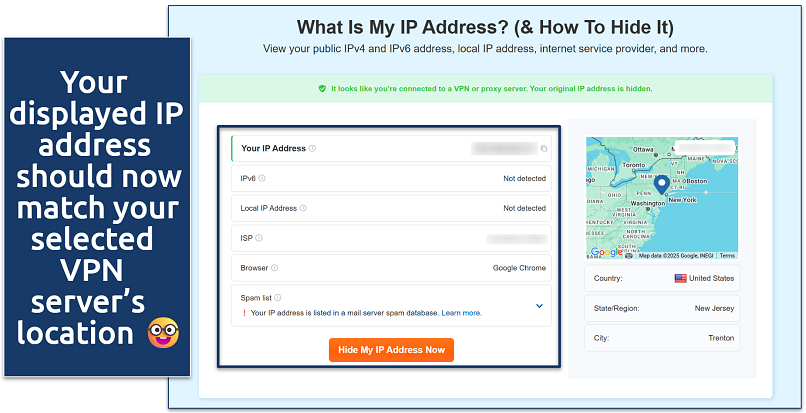 If your old IP is still showing, try reconnecting, switching servers, or restarting your VPN app
If your old IP is still showing, try reconnecting, switching servers, or restarting your VPN app
Pro Tip: To properly test your VPN’s kill switch, force the VPN to close unexpectedly (like quitting the app through Task Manager or Activity Monitor). If your internet stops working until the VPN reconnects, the kill switch is doing its job.
Similarly, if split tunneling is not set up correctly, important traffic might leak outside the VPN or you may still be routing unwanted apps through the VPN. To test it, enable split tunneling in your VPN settings, then try accessing the IP checker site in both a VPN-protected app and one excluded from the VPN. If neither or both tests show the VPN IP, the split tunneling feature may not be working as expected.
2. Look for IP, DNS, and WebRTC Leaks
Even if your VPN is connected, certain types of leaks can expose your real IP address and browsing activity. That’s why it’s important to test for IP, DNS, and WebRTC (Web Real-Time Communication) leaks — these are the most common ways your privacy could slip through the cracks. Here’s how to check for each:
IP and WebRTC Leak Test
Your IP address is like your digital fingerprint — it can be used to track your general location and internet activity. When using a VPN, your IP should change to match the VPN server. If it doesn’t, something’s wrong.
But there’s another catch: WebRTC. It’s a browser feature designed for real-time communication, like video calls and peer-to-peer file sharing. While useful, it can bypass your VPN and expose your real IP address — even if the VPN is connected. This is known as a WebRTC leak.
Also, don’t forget to check for IPv6 leaks, especially if your ISP supports it. Some VPNs only tunnel IPv4 traffic, which means your IPv6 address could still leak and expose your real location.
How to test:
Step 1. Make sure your VPN isn’t connected and open an IP leak & WebRTC test tool. Select I Have a VPN, and click the Start Test button.
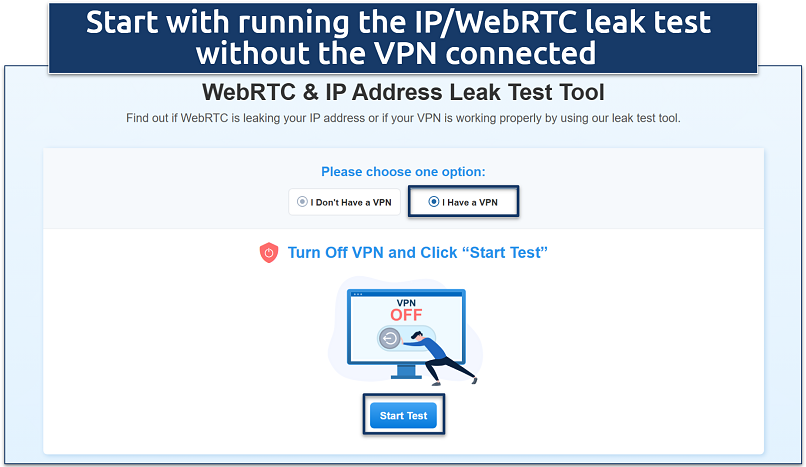 The test takes about a minute to complete
The test takes about a minute to complete
Step 2. After the first test is done, connect to a VPN server, and click on Complete Test.
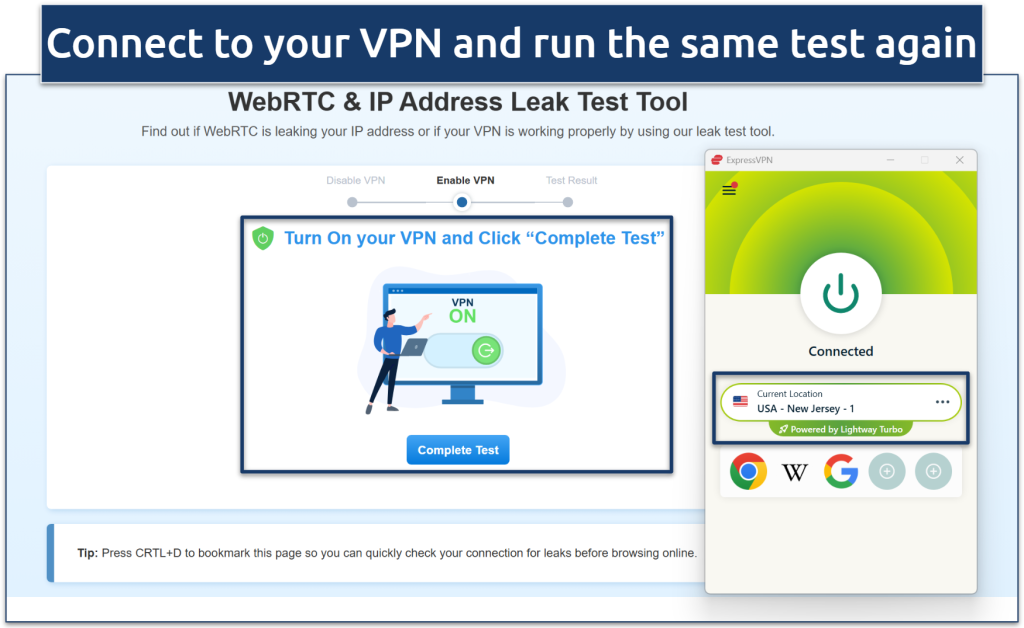 The test checks if your VPN is leaking any data
The test checks if your VPN is leaking any data
Step 3. Wait for the test to complete and you’ll get a detailed look at your VPN connection. If you still see your real IP, your VPN may not be fully protecting you. Try disabling WebRTC and IPv6 in your system or browser settings, or switch to a VPN that blocks these leaks by default.
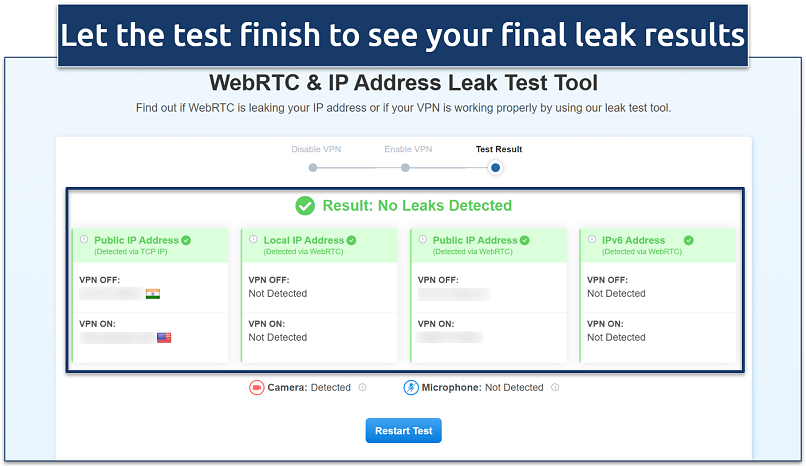 If everything shows up green, your connection is leak-free and secure
If everything shows up green, your connection is leak-free and secure
DNS Leak Test
Whenever you visit a website, your device needs to look up the site’s actual IP address. That’s the job of DNS, or Domain Name System — it translates website names like vpnmentor.com into the numeric addresses that computers use to connect to each other.
When your VPN is working correctly, all DNS requests are sent through the VPN’s own secure servers. But if these requests are still going through your internet provider’s servers instead, it’s called a DNS leak. This kind of leak doesn’t just reveal your IP address — it can expose your browsing patterns, like which websites you visit and how often, even if your actual traffic is encrypted. DNS leaks can also lead to DNS hijacking attacks, where your traffic is secretly redirected without your knowledge.
To check for a DNS leak:
- Visit a testing site like dnsleaktest.com.
- Run a standard or extended test (the extended test gives more detailed results).
- Once the test finishes, look at the list of DNS servers detected. If any of them belong to your ISP instead of your VPN provider, your DNS requests are leaking.
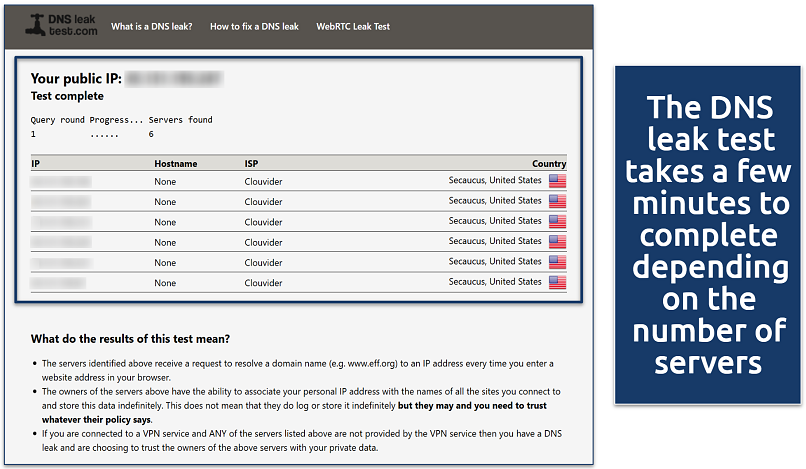 If the results show only your VPN’s servers, your connection is secure
If the results show only your VPN’s servers, your connection is secure
If your VPN is leaking DNS requests, your browsing activity may still be visible to third parties — even if your IP is hidden.
3. Run a Streaming Test
Most premium VPNs make it possible to securely access your favorite streaming platforms from anywhere. To verify that your VPN is properly working with streaming sites, do the following:
Step 1. Connect to a VPN server. Pick a server in the country where the streaming service you want is available.
Step 2. Open the streaming platform. Go to Netflix, BBC iPlayer, Amazon Prime Video, or whichever platform you’re trying to watch in HD. Try playing a show or movie as you normally would.
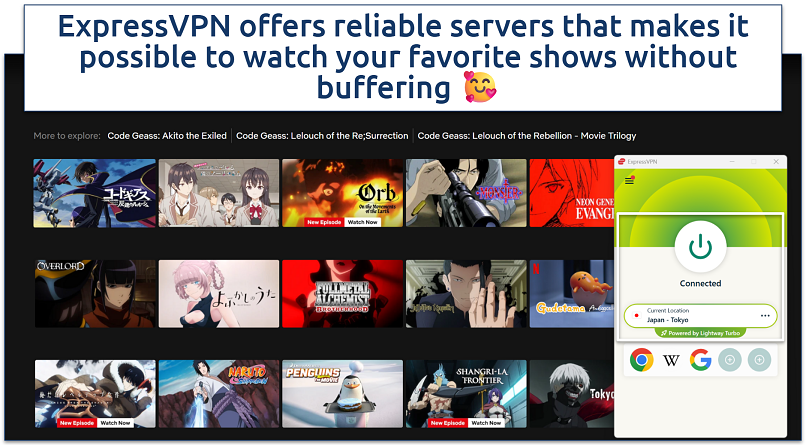 Safely access streaming platforms from anywhere
Safely access streaming platforms from anywhere
Step 3. Start watching. If the content plays without any errors or proxy warnings, your VPN is doing its job. If you hit a roadblock, switch to another server in the same country or check with your VPN’s support — they usually have a list of servers that work best for streaming.
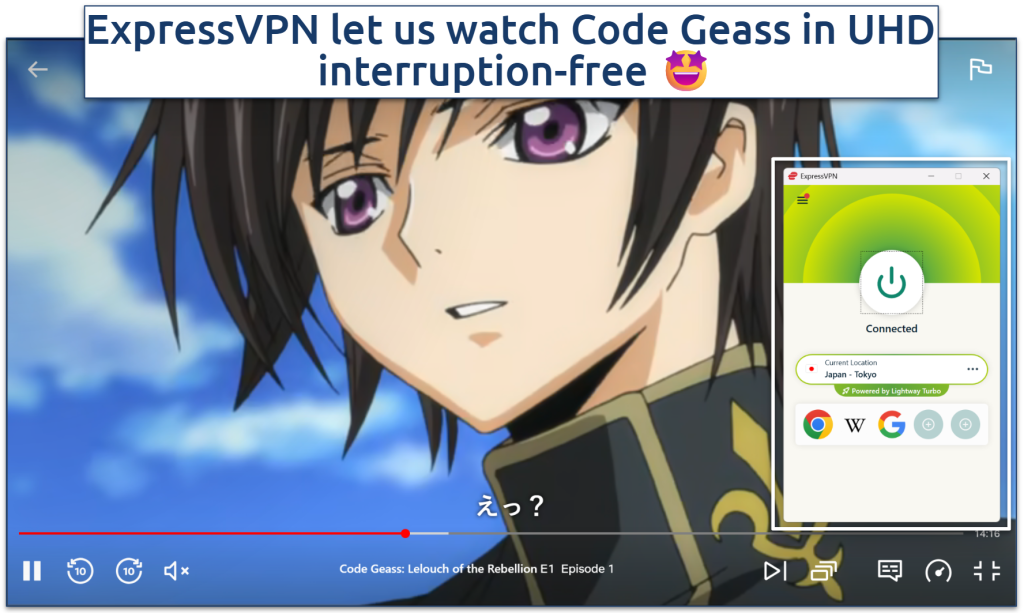 If you have any issues, try clearing cookies and turning off your VPN’s ad blocker
If you have any issues, try clearing cookies and turning off your VPN’s ad blocker
4. Check if Your VPN Connection Is Encrypted
A trustworthy VPN doesn’t just change your IP address — it also encrypts your internet traffic so no one can see what you’re doing online. This is what protects your data from snoopers, ISPs, and even hackers on public WiFi. Most premium VPNs use strong protocols like OpenVPN with AES-256 encryption, which is considered extremely secure.
But if you’re working with sensitive information or want to be sure your VPN is actually encrypting your traffic, it’s a good idea to test it manually using Wireshark — a free network analyzer tool.
Step 1. Install Wireshark
Go to the Wireshark website and download the installer for your operating system. During setup, make sure to install Npcap — it’s required to capture live traffic on most systems. Once it’s installed, launch Wireshark.
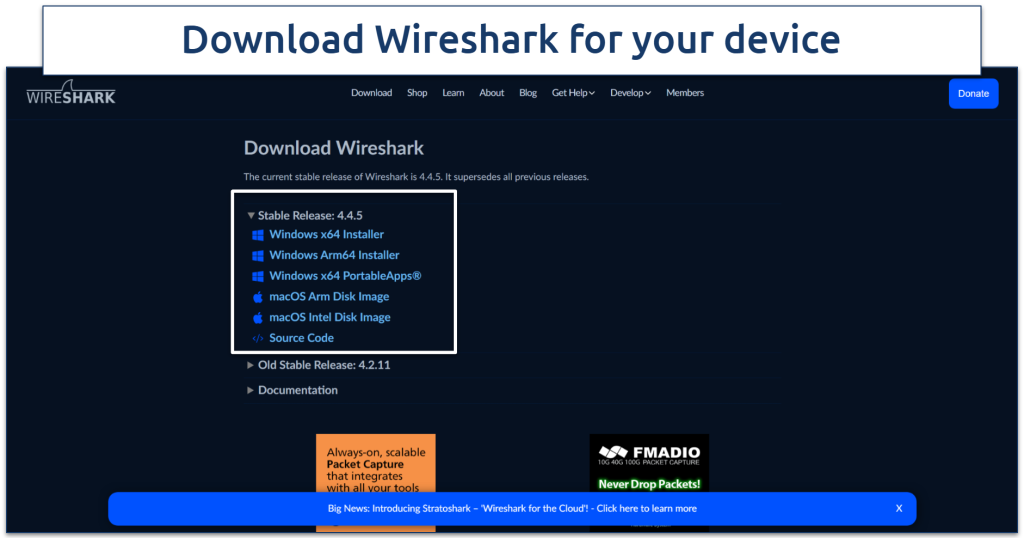 Choose the right installer for your device
Choose the right installer for your device
Step 2. Select Your Network Interface
You’ll need to tell Wireshark which connection to monitor. On the main screen, you’ll see a list of interfaces (network connections). Look for one labeled something like WiFi, Ethernet, or en0 on Mac — and pick the one with the most visible traffic activity (you’ll see small live graphs beside them).
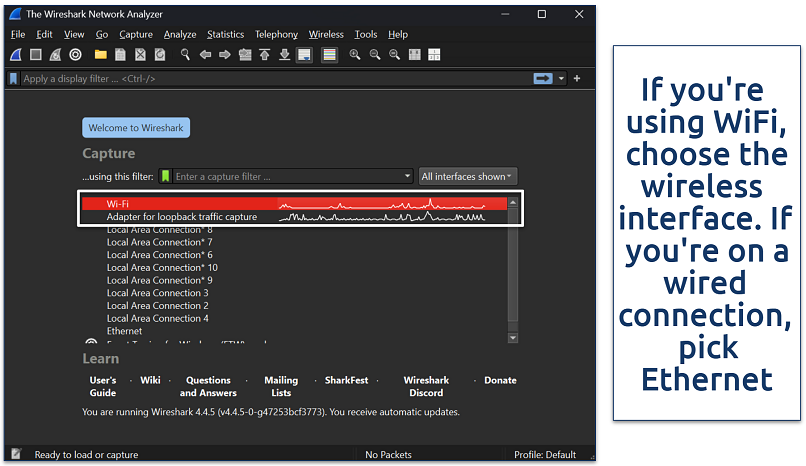 Loopback interfaces are for internal traffic and can usually be ignored
Loopback interfaces are for internal traffic and can usually be ignored
Step 3. Start Capturing Network Traffic
Before you start the capture, make sure you’re connected to your VPN. Then, hit the blue shark fin icon in the top-left corner to begin collecting data. Let it run for 2–3 minutes while you browse normally. This gives Wireshark enough data to analyze. Once you’re done, stop the capture by clicking the red square icon.
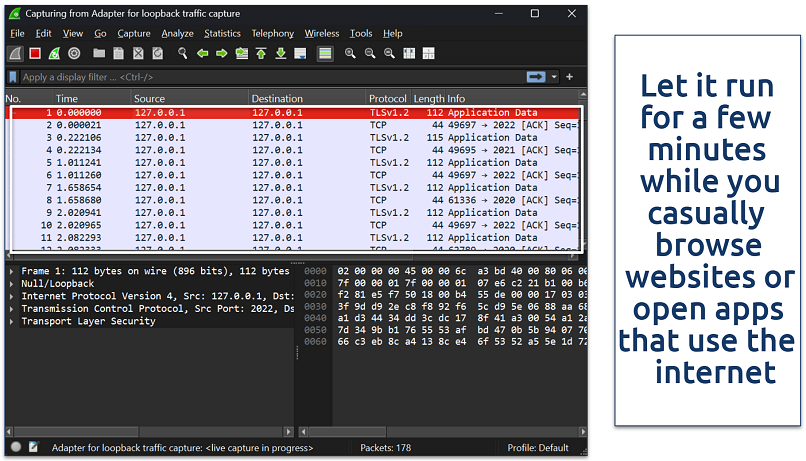 You’ll now have hundreds of packets to analyze
You’ll now have hundreds of packets to analyze
Step 4. Follow Your VPN Protocol Stream
Review the captured packets carefully and identify entries corresponding to your VPN protocol. Right-click on an entry matching your VPN protocol. Then select Follow, and choose your VPN protocol stream from the options provided. Wireshark will now display the detailed content of that specific connection.
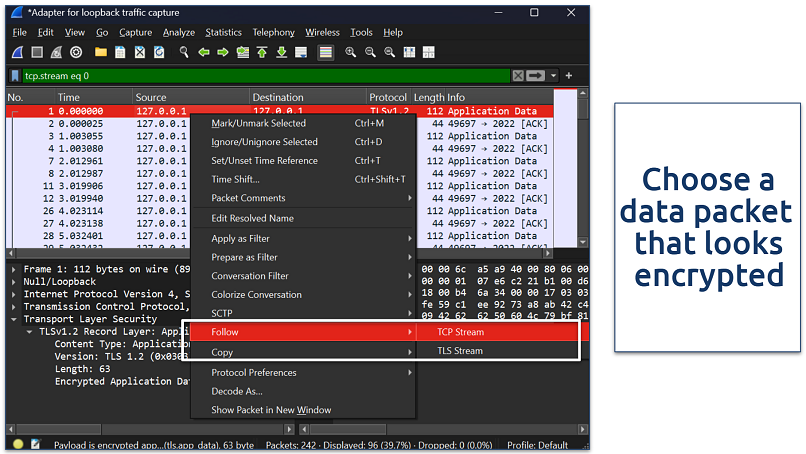 The TLS protocol packets are encrypted by your VPN
The TLS protocol packets are encrypted by your VPN
Step 5. Verify VPN Encryption
If everything looks like random characters or gibberish, that’s a good sign — your VPN is encrypting your data properly. But if you see readable text (like parts of websites, search queries, or file names), it means your traffic might not be encrypted. You may need to switch servers, change protocols in your VPN settings, or contact your VPN provider to investigate.
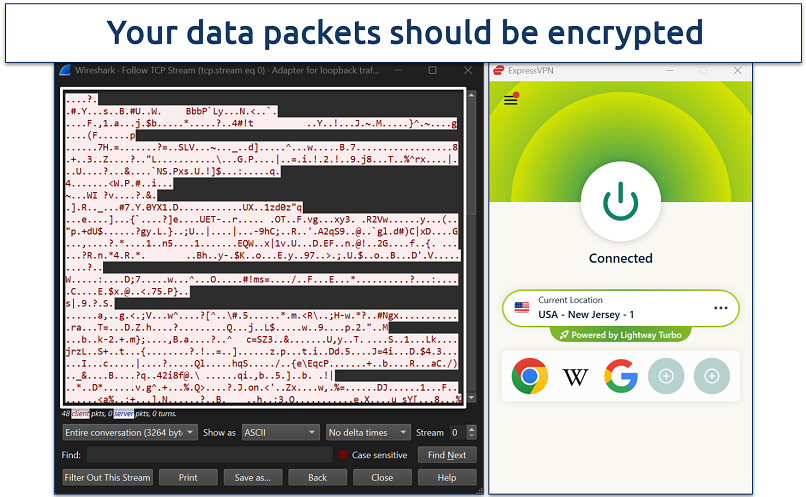 ExpressVPN encrypts all data packets with military-grade encryption
ExpressVPN encrypts all data packets with military-grade encryption
5. Do a Malware Protection Test
VPNs are great at hiding your IP and encrypting your internet traffic, but they don’t protect you from malware or viruses by default. If you download an infected file or click a malicious link, a VPN won’t stop it — encryption keeps your data private but not necessarily safe from threats.
That said, some VPNs include optional security tools that block access to malicious websites, trackers, and phishing pages. This is important, seeing as 12.8 million sites are infected with malware2. While these tools aren’t a replacement for antivirus software, they do add a helpful layer of protection.
So, here’s how to check if your VPN has any built-in protection features — and whether they actually work:
Step 1. Enable VPN Settings
Ensure malware protection or other security features are enabled in your VPN’s settings and connect to a server.
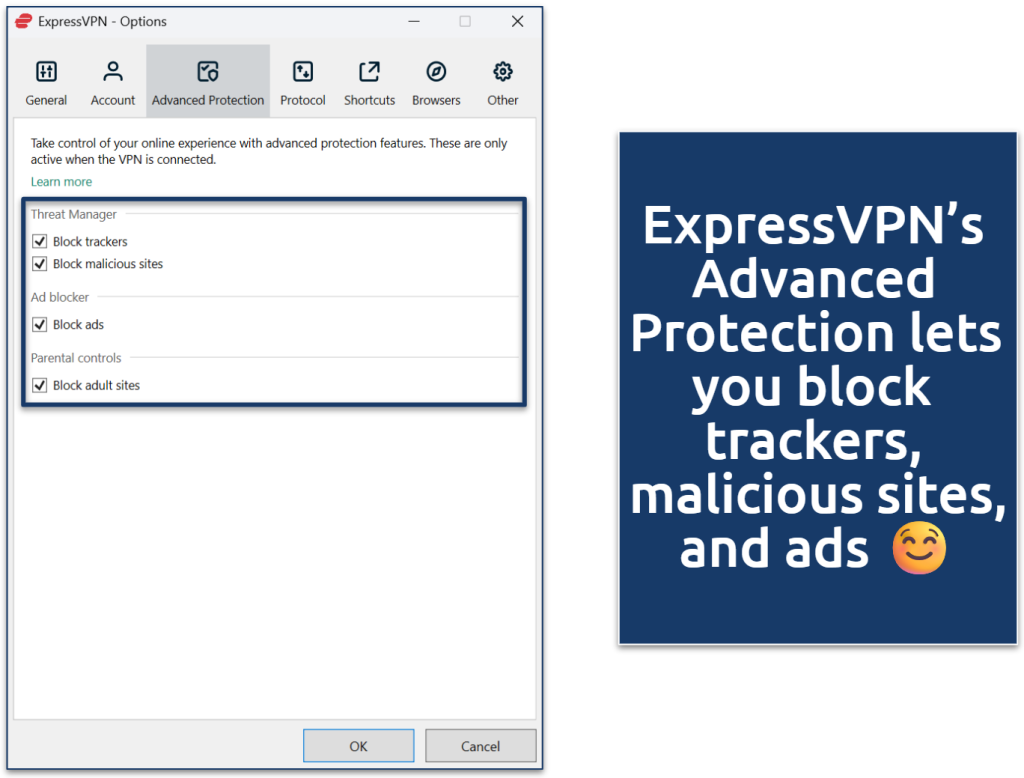 You can also install the browser extensions for added security
You can also install the browser extensions for added security
Step 2. Run a Fingerprinting Test
Visit a tracker testing website and run a fingerprinting test. This will help you test if your browser and connection are leaking any information that trackers can use to target you.
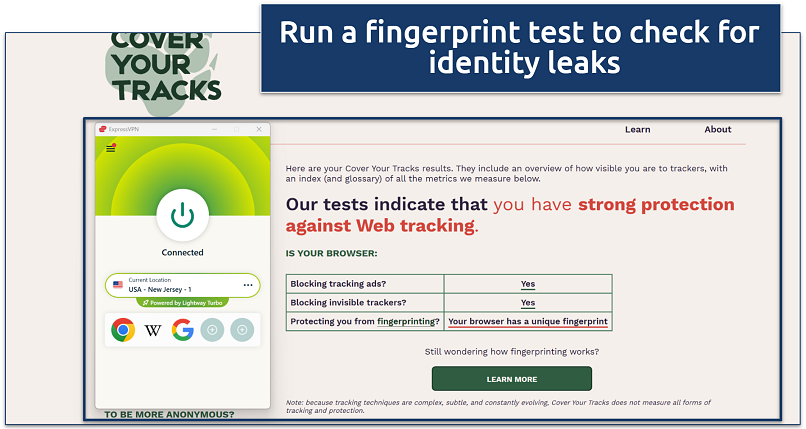 The more unique your fingerprint, the easier it is for advertisers to follow you across the web
The more unique your fingerprint, the easier it is for advertisers to follow you across the web
Step 3. Run a Phishing Test
You can also use a phishing test to check if your VPN blocks or warns you about opening malicious pages. If your VPN blocks or warns you about the test page, its protection is working. If not, it likely doesn’t include phishing filters — and that’s okay, as long as you’re using a proper antivirus.
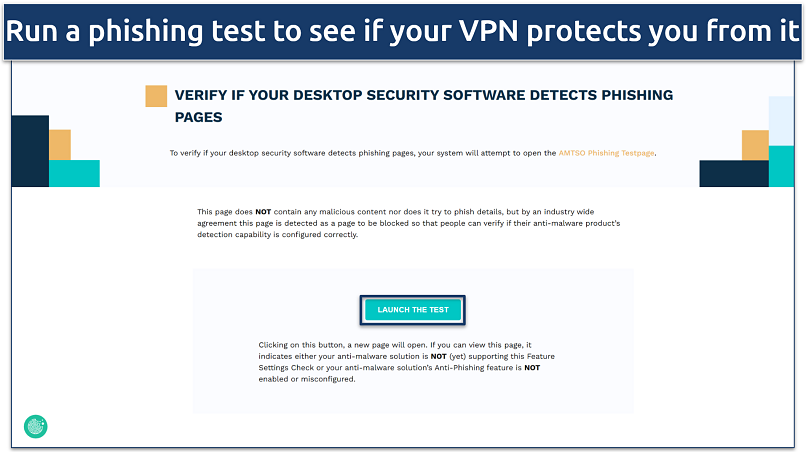 Make sure to use a reliable VPN with protection against phishing attacks
Make sure to use a reliable VPN with protection against phishing attacks
6. Perform a VPN Speed Test
Connect to several different VPN servers and run speed tests to measure performance. Go to a test site like speedtest.net to check download speeds, upload speeds, and ping times. I recommend testing servers at different distances from your location. Premium VPNs like ExpressVPN typically reduce speeds by only 3-10% compared to your regular connection.
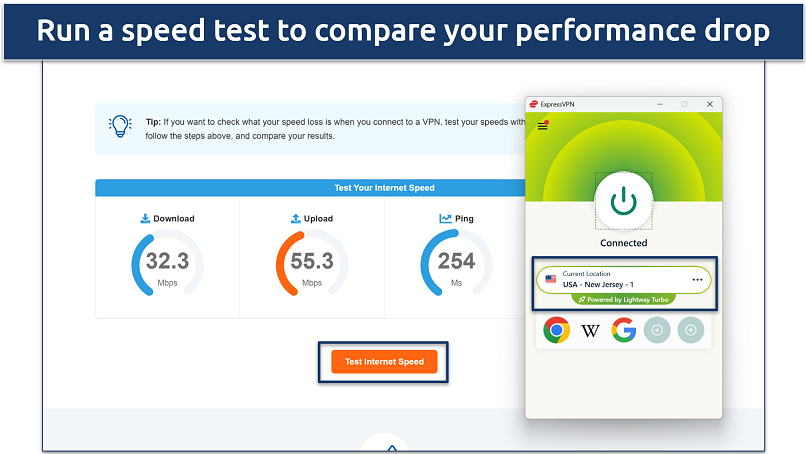 You need atleast 25Mbps of download speed to stream in UHD
You need atleast 25Mbps of download speed to stream in UHD
Best VPNs to Use in 2025
After thorough testing of multiple VPNs, I’ve selected providers with the strongest security and privacy features. These VPNs pass all leak tests, maintain fast speeds, and include features like split tunneling and kill switches. They’re also compatible with major operating systems and offer user-friendly apps that make testing simple.
1. ExpressVPN — Excellent Speeds and Solid Leak Protection for Reliable Connections

Editor’s Choice
Try Risk-Free for 30 Days
Tested June 2025
Sky
ESPN+
Dazn
FIFA+
Netflix
Disney+
APV
More
ExpressVPN is my top recommendation if you’re looking for strong leak protection without sacrificing speed. Its proprietary Lightway protocol is designed for fast, stable connections, even on slow networks. And thanks to its TrustedServer technology, all servers run entirely on RAM, meaning no user data is ever written to a hard drive — a major boost for privacy.
In my tests, ExpressVPN successfully prevented IP, DNS, and WebRTC leaks, keeping my real location completely hidden. The kill switch (called Network Lock) worked as expected, instantly cutting off internet access when I manually disconnected the VPN. I also tested the Threat Manager feature, which effectively blocked trackers and access to known malicious sites.
The only downside is that it can be a little pricey. But ExpressVPN frequently offers generous discounts — and with its trustworthy 30-day money-back guarantee, you can try it out risk-free.
- One of the fastest VPNs
- Works with top streaming sites
- A proven no-logs policy
- Limited customization
- Smart Location isn’t always the fastest
2. CyberGhost — User-Friendly Apps That Work Seamlessly Across Devices
CyberGhost is a great pick if you want something that’s both secure and easy to use. Its apps are simple to navigate, and the built-in Smart Rules feature gives you more control without the complexity. For example, you can set it to automatically connect to a VPN when you join an unsecured network, like public WiFi. CyberGhost passed all my manual leak tests, and its NoSpy servers offer extra privacy since they’re fully owned and managed by CyberGhost — no third parties involved.
The only drawback is that the monthly plan is on the pricier side, and it comes with a shorter 14-day money-back guarantee. However, the long-term options offer better value and include an extended 45-day refund period, giving you plenty of time to try CyberGhost for free.
- Secure access to streaming
- Military-level security
- Designed for ease of use
- Slower long-distance servers
- Doesn’t work in China
3. Private Internet Access — Customizable Settings to Balance Speeds and Security
PIA is ideal if you like having full control over your VPN settings. You can easily switch between AES-128 and AES-256 encryption, adjust MTU size for faster performance, and choose from multiple secure protocols depending on your needs. During my tests, the MACE feature effectively blocked ads and trackers, and I was able to connect over 10 devices at once with no noticeable slowdown.
If you’re new to VPNs, the customization options might be overwhelming. However, PIA works well with default settings. You can try all features for free with its 30-day money-back guarantee.
- Many servers to choose from
- Customizable security settings
- Solid choice for torrenting
- Hit-or-miss customer support
- Tricky to navigate
Our Methodology for Testing VPNs
We take a hands-on, systematic approach to evaluate each VPN’s performance and security. This includes checking for IP, DNS, and WebRTC leaks to ensure your real location stays hidden and measuring speed consistency across different server locations at various times of the day to see how the VPN holds up under different conditions.
We also test each VPN’s core security features, like encryption strength and whether the kill switch works as expected during sudden disconnects. Since many people use VPNs for entertainment or gaming, we also see how well each provider performs with popular streaming platforms and online games — focusing on reliability, load times, and overall user experience. By testing under both light and heavy network conditions, we get a clear picture of how each VPN performs in real-world use.
What Can I Do if My VPN Isn’t Working Properly?
If your VPN tests reveal issues, there are several troubleshooting steps you can take:
- Switch servers. Connect to a different server, ideally one closer to your location. This often resolves speed and connectivity issues.
- Change VPN protocols. Try switching between available protocols (like OpenVPN, WireGuard, or IKEv2). Some protocols work better on certain networks or devices.
- Check your firewall settings. Your firewall might be blocking VPN traffic. Add exceptions for your VPN app in the firewall settings.
- Update your VPN app. Outdated VPN apps can cause connection problems. Make sure you’re running the latest version.
- Clear your browser cache. Stored data can conflict with your VPN connection. Clearing your cache and cookies often helps.
- Turn off double VPN. Some issues happen when double VPN is enabled. Turn it off if your provider supports it and see if performance improves.
- Try a different port. Some VPNs let you change the port they use to connect — switching can help bypass restrictions or improve stability.
- Check your power settings. On some devices, power-saving features can interfere with VPN apps in the background.
- Uninstall other VPNs. If you’ve used other VPN services in the past, leftover files or settings might conflict with your current one.
- Restart your router. A simple reboot can clear up temporary network issues that affect VPN performance.
- Try an obfuscated server. Obfuscation helps disguise VPN traffic as regular internet traffic, which can help in places where VPNs are blocked or restricted. Some providers require you to enable this manually, but ExpressVPN uses obfuscation automatically on all servers — no extra setup needed.
- Contact customer support. If basic troubleshooting doesn’t work, reach out to your VPN’s support team. They can help identify specific issues.
Common VPN Testing Mistakes to Avoid
When testing your VPN, watch out for these common pitfalls that could give you inaccurate results:
- Testing during peak hours. Internet speeds naturally fluctuate throughout the day. Testing during high-traffic times can give misleading results about your VPN’s performance.
- Not running multiple tests. Single tests don’t provide reliable data. I recommend running at least 3 tests per server at different times of day.
- Ignoring background processes. Other apps using your internet connection can affect test results. Close unnecessary programs before testing.
- Using unreliable testing tools. Stick to reputable speed test services and leak testing websites. Some free tools provide inaccurate results or could even be malicious.
- Failing to test different locations. Testing only nearby servers doesn’t give you a complete picture of VPN performance. Test both local and international servers.
FAQs on VPN Testing
How do I know if a VPN is safe?
A VPN is generally safe if it doesn’t leak your data, uses strong encryption, has a strict no-logs policy, and comes from a trustworthy company with a good track record. You can confirm this by checking independent audits, reading recent security test results, and making sure the VPN hasn’t been involved in any major data scandals.
Why is my VPN connected but still not working?
If your VPN is connected but not working, it’s usually because something is blocking or interfering with the connection — like a firewall, unstable network, wrong server, or DNS misconfiguration. Sometimes, the VPN connects successfully, but websites still won’t load, or your real IP is exposed due to a leak or a broken kill switch. Restarting the VPN, switching servers, or checking your internet settings usually helps narrow it down.
Can a slow internet connection stop my VPN from working?
Slow internet can significantly impact VPN performance but won’t completely stop it from working. VPN encryption adds overhead to your connection, so starting with slow speeds makes this more noticeable. Using lightweight protocols like Lightway and WireGuard or connecting to closer servers can help minimize speed loss on slower connections. You can also run speed tests to check if your VPN is working as expected and if there are no other bottlenecks.
How often should I test VPNs?
You should test your VPN regularly — at least every few weeks — especially after updates, switching servers, or changing settings. It’s also a good idea to run quick tests whenever you connect to public WiFi or use the VPN for something sensitive like streaming, torrenting, or accessing restricted content. This helps catch leaks, connection issues, or performance drops early on.
Can I be tracked if I use a VPN?
Yes, you can still be tracked even if you’re using a VPN — especially if you’re logged into online accounts, accept cookies, or leave a unique browser fingerprint. Using private browsing mode and regularly clearing cookies helps maintain anonymity. Also, make sure to test your VPN for fingerprinting for added security.
To summarize, these are the best VPNs in 2025…
References
React to this headline:
 ExpressVPN
ExpressVPN CyberGhost
CyberGhost PIA
PIA
